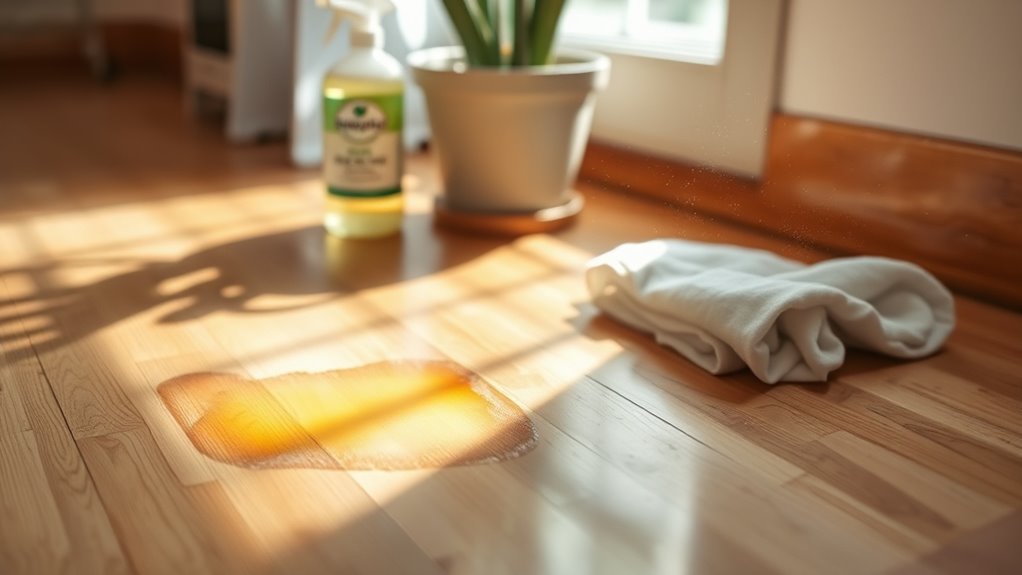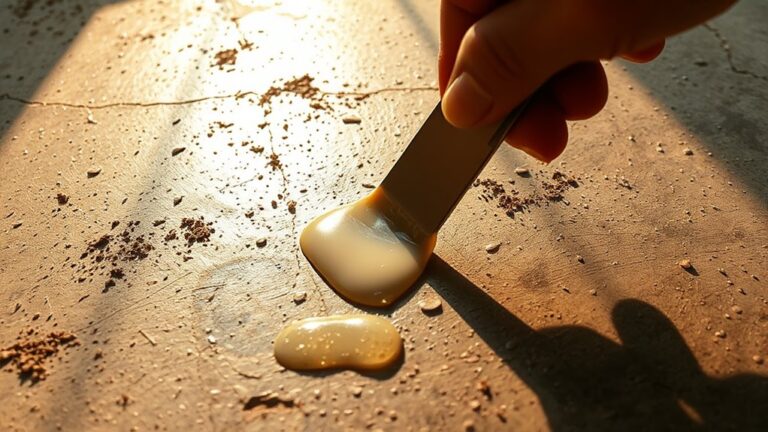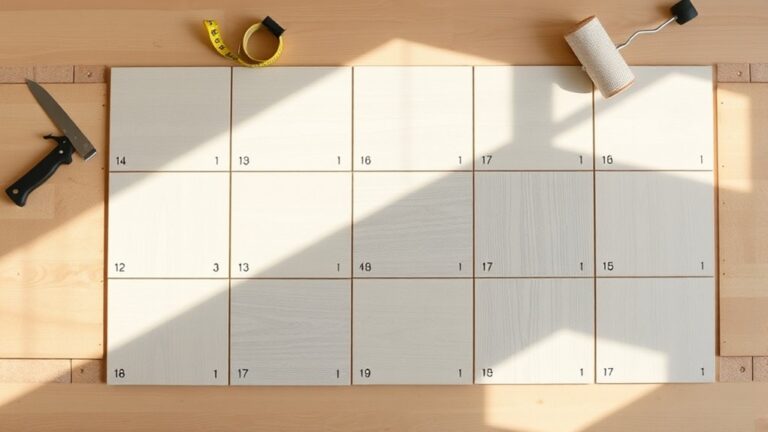Start by locating the urine spots with a black light and blot fresh stains gently—don’t rub. Clean using a pH-balanced enzymatic cleaner safe for hardwood to break down urine proteins and neutralize odors. For natural alternatives, use equal parts white vinegar and water, followed by baking soda to absorb smells. If odors persist or wood is damaged, refinishing may be needed. Prevent future issues by training your pet and maintaining regular pavimento care. You’ll find more effective steps ahead to fully restore your hardwood.
Identifying the Source of the Odor
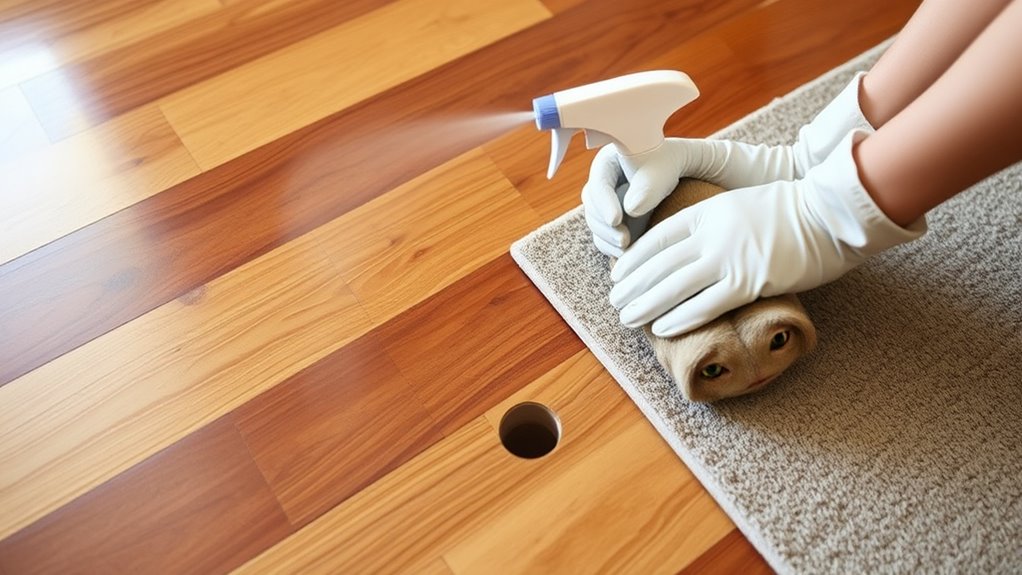
Where exactly is that unpleasant smell coming from? To regain control over your space, start with odor detection techniques focused on pinpointing the source. Use a black light in a darkened room; cat urine stains fluoresce, making identifying urine stains straightforward. Pay close attention to corners, baseboards, and under furniture where your cat may have urinated unnoticed. Don’t rely solely on your nose—urine can seep into cracks or between floorboards, making detection tricky. Mark any spots you find to guarantee targeted treatment later. This methodical approach frees you from uncertainty, allowing you to address the problem precisely without guesswork. Accurate identification is your first step toward eliminating the odor and reclaiming your hardwood floors.
Immediate Cleanup Steps for Fresh Urine Spots
Once you’ve located the urine spots, act quickly to prevent the odor from setting into your hardwood floors. Your immediate response is essential. Start by blotting the area with paper towels or a clean cloth to soak up as much urine as possible—avoid rubbing, which can spread the stain. Next, gather your cleaning supplies: a mild detergent, water, and absorbent towels. Mix the detergent with water, dampen a cloth, and gently clean the spot. Rinse with a clean, damp cloth to remove residue. Finally, dry the area thoroughly using a dry towel or fan to prevent moisture damage. Prompt action with the right steps guarantees you stop the urine from seeping deeper, preserving your floor’s finish and preventing stubborn odors from developing.
Choosing the Right Cleaning Products for Hardwood
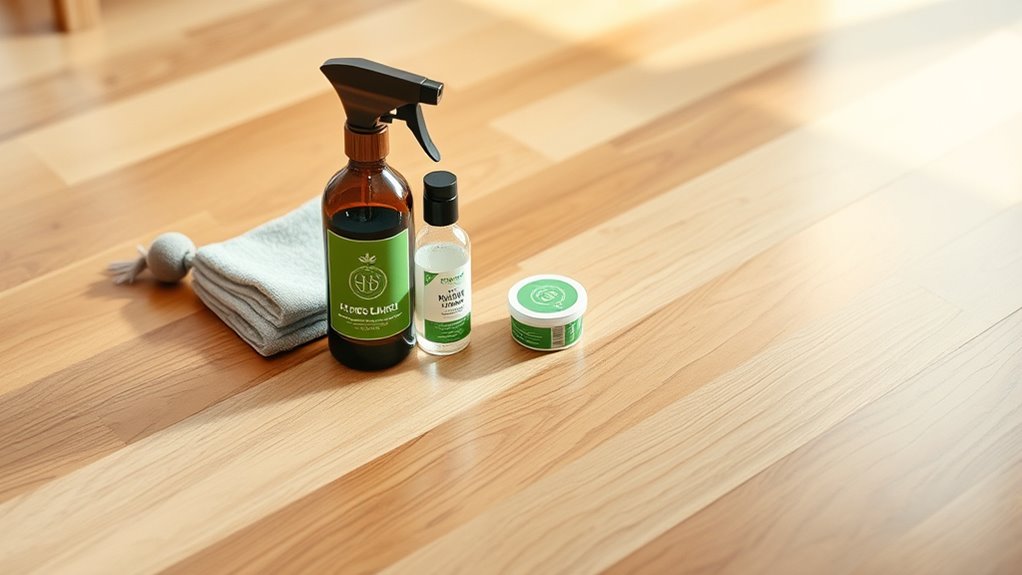
Although many cleaning products claim to remove pet odors, not all are safe for hardwood floors. You want cleaning solutions that effectively neutralize urine without damaging the wood’s finish. Look for pH-balanced, non-toxic options designed specifically for hardwood.
To guarantee product effectiveness, check labels for these qualities:
- Safe for sealed hardwood to avoid warping or discoloration
- Contains odor-neutralizing agents, not just masking scents
- Free of harsh chemicals like ammonia or bleach that can strip finish
Test any cleaner on a small, hidden area first to confirm it won’t dull your floor. Choosing the right product gives you freedom from lingering smells while preserving your hardwood’s beauty and integrity.
Using Enzymatic Cleaners to Break Down Urine
Enzymatic cleaners break down urine molecules at their source, effectively eliminating odors rather than masking them. When applying, saturate the affected area thoroughly and allow the cleaner to sit for the recommended time to guarantee full enzyme activity. Choose a product specifically designed for pet urine on hardwood to avoid damage and maximize results.
How Enzymatic Cleaners Work
Because cat urine contains proteins and organic compounds, regular cleaners often can’t eliminate the odor completely. Enzymatic cleaners use enzyme action to target these molecules, breaking them down into harmless components. This process achieves thorough odor breakdown, freeing your space from lingering smells.
When you apply an enzymatic cleaner, imagine:
- Tiny enzymes seeking out and digesting urine proteins
- Organic compounds decomposing into neutral elements
- Odor molecules vanishing as they’re chemically neutralized
This targeted approach means the source of the smell is destroyed, not just masked. By understanding how enzymatic cleaners work, you gain a powerful tool to reclaim your hardwood floors and enjoy a fresher, freer home environment.
Application Tips and Tricks
Now that you know how enzymatic cleaners break down urine molecules, it’s important to apply them correctly for the best results. Start by blotting the affected area with a clean cloth to soak up excess moisture before applying the cleaner. Use application methods like spraying evenly or pouring directly onto the stain to guarantee thorough coverage. Avoid oversaturating, which can damage hardwood floors. Let the cleaner sit for the recommended time, usually 10-15 minutes, to allow enzymes to work effectively. Gently blot the area again to remove excess cleaner without rubbing it in. For stubborn odors, repeat cleaning techniques as needed. Finally, allow the floor to air dry completely. Following these precise application methods will maximize odor removal and protect your floors.
Choosing the Right Product
Several effective products on the market use enzymes to break down cat urine at a molecular level. When choosing the right enzymatic cleaner, focus on product effectiveness and scent preferences to guarantee you’re comfortable using it regularly. Look for formulas specifically designed for hardwood floors to protect the finish while eliminating odors.
Consider these factors:
- Clear labeling that specifies urine odor elimination
- Fragrance options, from unscented to mild natural scents
- Non-toxic and safe ingredients for pets and family
Using an enzymatic cleaner that matches your scent preference encourages consistent use, which is key to fully removing odors. Prioritize products with proven enzyme activity to break down urine compounds quickly and thoroughly, giving you the freedom to enjoy fresh-smelling hardwood floors without worry.
Natural Remedies to Neutralize Cat Urine Smell
Natural remedies like baking soda, white vinegar, and enzymatic cleaners can effectively neutralize cat urine odors on hardwood floors. Start by mixing a vinegar solution—equal parts white vinegar and water—to clean the affected area. After drying, sprinkle baking soda directly over the spot to absorb lingering smells. For tougher odors, combine hydrogen peroxide with a few drops of essential oils, like lavender or eucalyptus, and apply carefully to avoid discoloration. You can also place coffee grounds or citrus peels nearby; their natural scents help mask and neutralize odors over time. These methods are safe, eco-friendly, and let you avoid harsh chemicals while restoring your floor’s freshness. Make sure to test any solution on a small hidden area first to protect your hardwood’s finish.
Preventing Future Accidents on Hardwood Floors
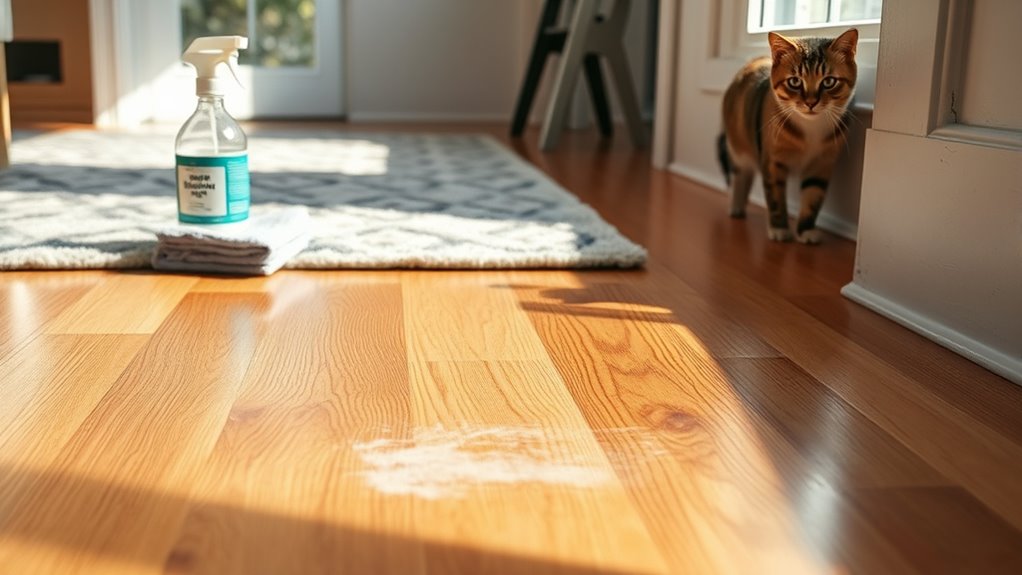
Although addressing existing odors is essential, preventing future accidents on hardwood floors is equally important to maintain a clean and odor-free home. Understanding cat behavior can help you anticipate and reduce unwanted urination. Start by creating a consistent litter box routine and ensuring boxes are clean, as cats avoid dirty areas. Next, limit access to hardwood areas if your cat shows a preference for certain spots. Finally, use enzymatic sprays specifically designed for odor prevention to discourage repeat marking.
- Visualize a spotless litter box with fresh, unscented litter
- Imagine closing doors or using pet gates to restrict floor access
- Picture applying odor-neutralizing spray on vulnerable spots regularly
These steps empower you to protect your floors and keep your home fresh.
Deep Cleaning Techniques for Set-In Odors
When cat urine has soaked deeply into your hardwood floors, simple cleaning won’t cut it—you’ll need targeted deep cleaning techniques. Start by applying an enzymatic cleaner specifically designed for pet odors; these break down urine molecules at the source. Saturate the affected area thoroughly and let it sit for at least 10-15 minutes. Next, scrub gently with a soft brush to help the cleaner penetrate the wood grain. Afterward, wipe up excess moisture with a clean cloth and allow the floor to dry completely. For stubborn odors, repeat this process. Avoid harsh chemicals that can damage your floors. Deep cleaning is essential for effective odor removal, freeing your space from persistent smells and restoring the natural atmosphere you deserve.
When to Refinish or Replace Hardwood Flooring
If deep cleaning doesn’t fully eliminate the cat urine smell, it might be time to contemplate refinishing or replacing your hardwood floors. Persistent odors often indicate urine has penetrated deep into the flooring materials, making surface treatments ineffective. Refinishing techniques like sanding and sealing can remove the contaminated top layer, restoring both appearance and freshness. However, if the damage runs too deep or the flooring is old, replacement may be the better option.
When odors persist, consider sanding, sealing, or replacing hardwood floors to remove deep-set cat urine damage.
Consider these signs to decide:
- Dark stains or warping visible beneath the finish
- Lingering urine smell despite thorough cleaning
- Flooring materials weakened or structurally compromised
Tips for Maintaining a Fresh-Smelling Home With Pets
Keeping your home smelling fresh with pets requires consistent cleaning and proactive measures. Start by establishing a routine to clean floors and pet areas, focusing on eliminating urine promptly to prevent lingering odors. Use enzymatic cleaners designed for pet stains to break down odor-causing compounds effectively. Incorporate pet friendly scents such as lavender or chamomile diffusers, which neutralize odors without harming your pets. Regularly wash pet bedding and toys to reduce trapped smells. Make certain proper ventilation by opening windows or using air purifiers with activated carbon filters to maintain air quality. Finally, prevent odors by training your pets and providing designated bathroom spots. These steps create a cleaner, freer environment where you and your pets can comfortably coexist without worrying about unwanted smells.

